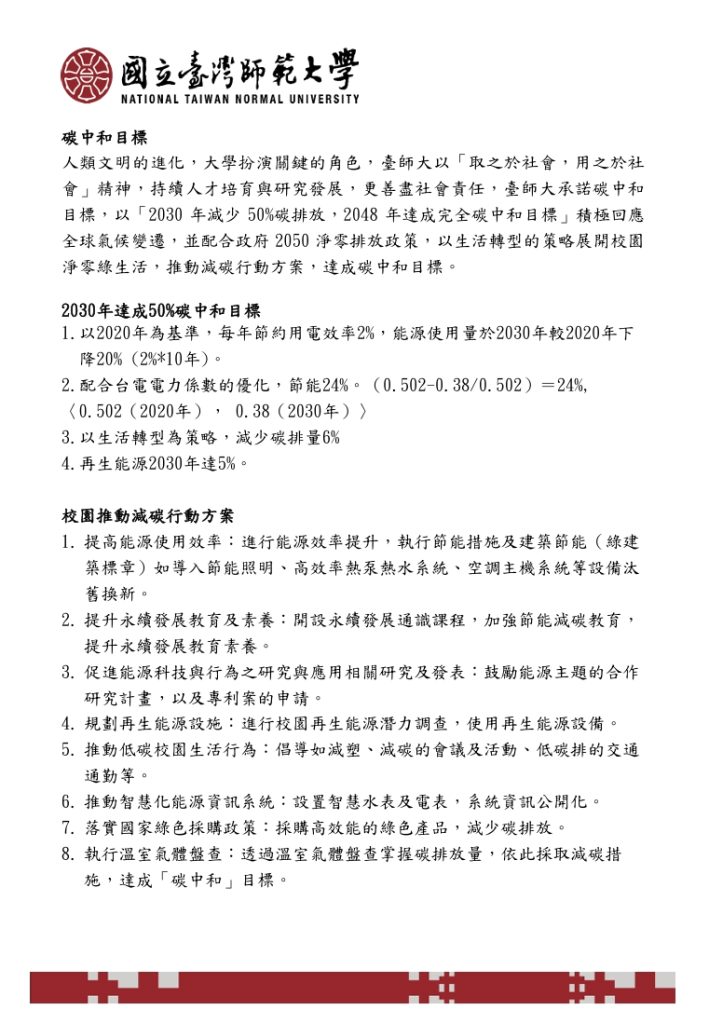2024 SDG 13 English
- 13.2.1 Low-carbon energy tracking
- 13.2.2 Low-carbon energy use
- 13.3.1 Local education programmes on climate
- 13.3.2 Climate Action Plan, shared
- 13.3.3 Co-operative planning for climate change disasters
- 13.3.4 Notify and support the Government
- 13.3.5 Collaboration with Non-Governmental Organizations on Environmental Education
- 13.4.1 Commitment to carbon neutral university
13.2.1 Low-carbon energy tracking
NTNU has an energy management policy and energy conservation goals. The Information Technology Center deployed 471 virtual machines across 29 physical servers in 2023, resulting in an annual energy savings of approximately 2.353 million kWh. Additionally, the computer room at the Linkou campus saves about 240,000 kWh per year. The university has also implemented an intelligent energy monitoring system, such as using a heat pump system to maintain the pool temperature year-round while continuously monitoring energy consumption. The Energy Conservation Task Force establishes energy-saving measures annually, such as turning off water dispensers during the Lunar New Year, providing subsidies for air conditioner cleaning, adjusting temperatures according to the season, and assigning inspectors to inspect energy usage across the campus. Energy usage is tracked every month.
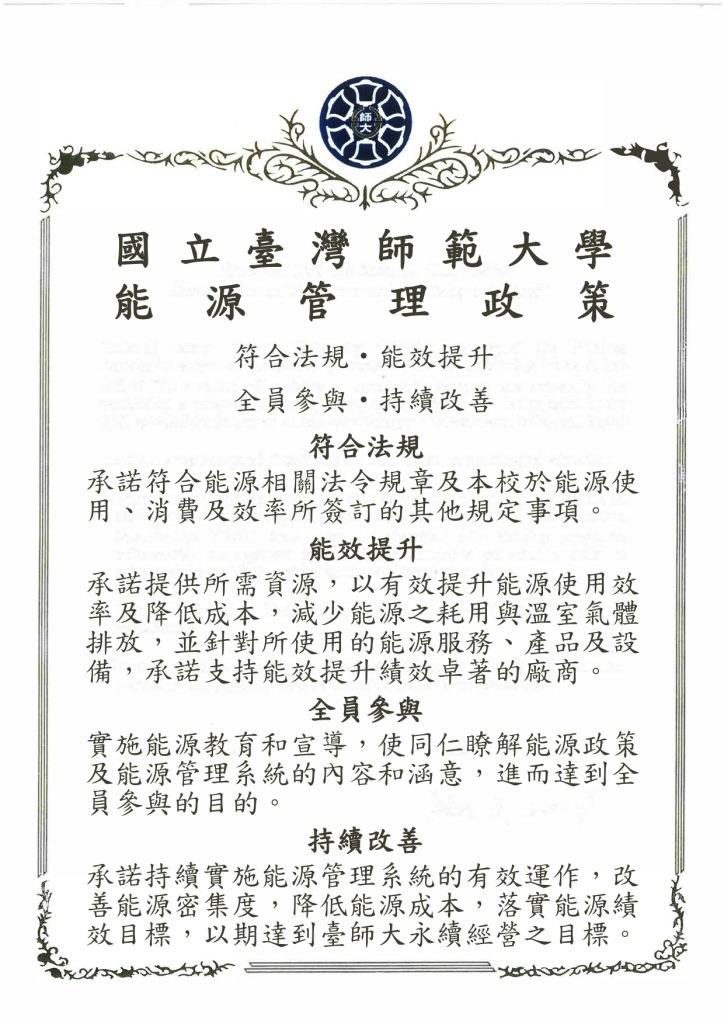
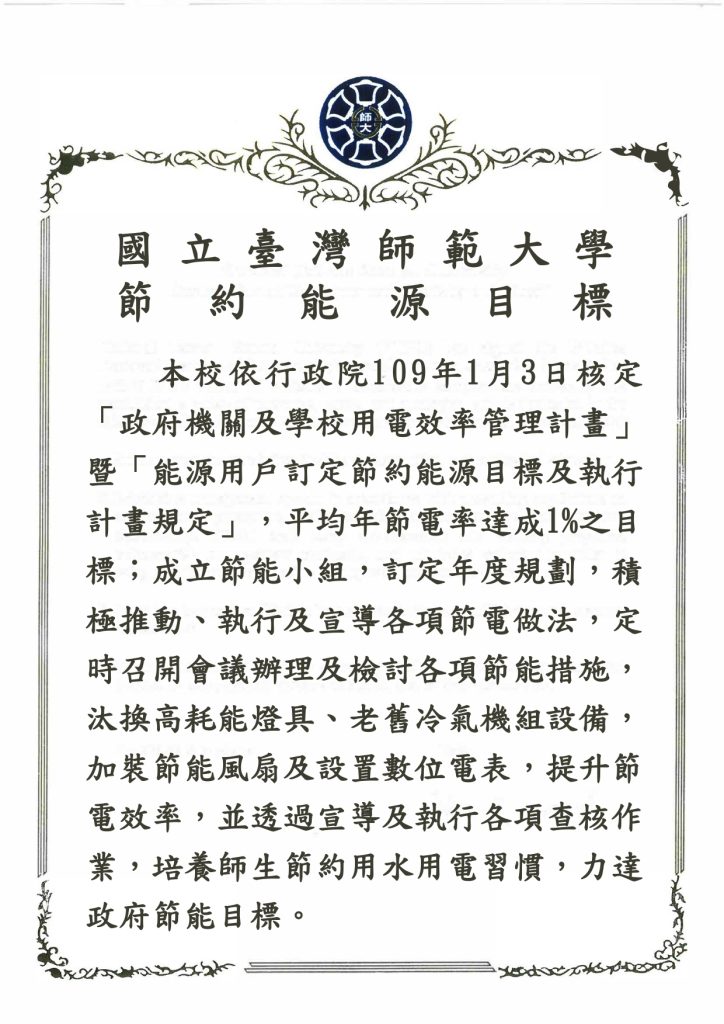
13.2.2 Low-carbon energy use
At the Heping Campus, solar panels are installed on the Career Services Building, the Bo-Ai Building, and the Education Building, generating a total of 367,776 kWh in 2023. Additionally, in 2023, new solar photovoltaic systems were installed at the Linkou Campus on buildings such as the Research Complex, Lecture Hall Ⅱ, the Administration Building, the Library, and the dormitories.
13.3.1 Local education programmes on climate
1. NTNU has implemented the Ministry of Education’s “National Elementary and Secondary Schools Integrated with Community Sustainable Development Program” four years from 2019 to 2023. It aimed to enhance education in rural coastal areas and establish the connection between climate change and disaster prevention.
For example, the program helps Taichung Tbulan Elementary School, located on the banks of the Dajia River, serving as its unique curriculum’s central axis. In line with the 12-year national curriculum, the school integrates the original “traditional Atayal culture and ecological wisdom” into the school’s customized curriculum, incorporating “conservation,” “disaster prevention,” “culture,” “economy,” “ecology,” “arts and literature,” “wisdom,” and “forests” into the development of the “TMALI” program, and along with the traditional Atayal fishing and hunting culture and disaster prevention and wisdom of the local Devlans. Through “study tours,” “experiential exploration,” and “action learning,” the program aims to lead students to a deeper understanding of the value of local characteristics in the mountains and waters of the region, to develop regional marketing plans, and to change students’ attitudes toward life and bring them closer to the relationship between people and water in nature.
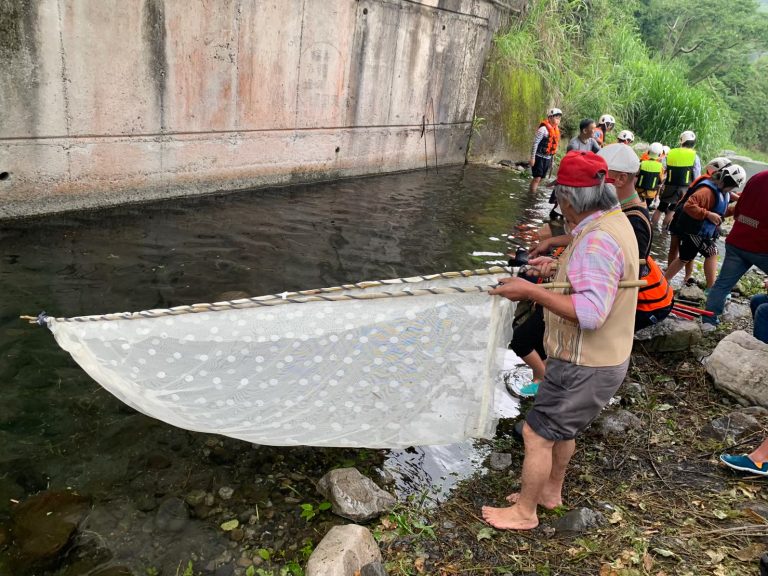
2. The Graduate Institute of Sustainability Management and Environmental Education at NTNU leads the Ministry of Environment’s 2023 “GEEP APRC (Global Environmental Education Partnership – Asia Pacific Regional Center)” to collaborate with experts from governments, academia, industry, and non-governmental organizations across the Asia-Pacific region to facilitate knowledge exchange and promote environmental education. The program themes include Environmental Education Act, Climate Change, Marine Debris, Sustainable Agriculture, Eco-Schools, Community Environmental Education, Personnel Training, and Educational Material Development. Key activities include the Global Environmental Education Partnership Advisory Council Meeting, the 52ND Annual Conference of NAAEE (Northern American Association for Environmental Education), the 2023 International Symposium “Transitioning to Net-Zero through Resource Circulation”, and the 2023 International Environmental Issues and Education for Youth.
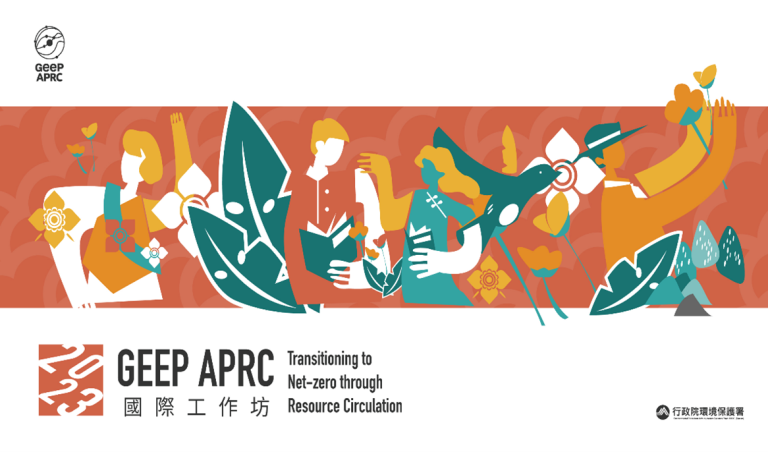
13.3.2 Climate Action Plan, shared
NTNU’s Climate Change Action Plan, the specific approaches are as follows:
1. Education and Research
The University has introduced innovative environmental sustainability courses, programs, and departments to promote energy technology and behavioral innovations in teaching and research. Specific outcomes include establishing the Graduate Institute of Sustainability Management and Environmental Education, which focuses on the interaction between “humans and the environment.” In 2023, it also established the “Graduate Institute of Green Energy and Sustainable Technology” under the newly established “College of Industry and Academia Innovation.” Through industry-academia cooperation, this institute aims to build a cross-disciplinary green energy application platform in collaboration with enterprises, nurturing senior-level green energy professionals and strengthening the green energy participation system.
2. Environmental Facility Management
Facility management is addressed from various perspectives, such as energy resource management, sustainable procurement, green buildings, cultural sustainability, and low-carbon campus transportation. Concrete achievements include constructing a new green building, Dormitory 2, equipped with environmentally friendly facilities. Additionally, 100% of newly purchased campus vehicles are low-carbon electric vehicles.
3. Social Engagement and Social Service
By combining the resources of faculty, students, and administrators and establishing partnerships with public agencies, the University actively engages in social care initiatives in collaboration with surrounding communities and senior care centers for Indigenous peoples. Diverse courses, such as gardening, exercise, and health, are offered to promote physical well-being, social engagement, and multiple intelligences. Notable efforts include the long-term “Building a Sustainable and Senior-Friendly Community” project, which fosters interaction between the University, local governments, businesses, and community groups.
4. Environmental Governance
NTNU emphasizes the importance of sustainable development through strategies encompassing academia, participation, campus management, and administrative planning. Specific actions include establishing campus plastic reduction regulations and promoting plastic reduction and sustainability initiatives.
5. Other environmental actions:
(1) Promote regional and global environmental education projects. Main topics include climate change education, national-level assistance and support for environmental education, participation in the Global Environmental Education Partnership Conference and the North American Environmental Education Annual Conference, and ecological youth leadership training camps.
(2) The library’s collection resources are committed to digitizing Open Course Ware to selflessly transmit academic output and implement the concept of building a lifelong learning environment.
(3) Promotion of humanities and arts education related to environmental protection, such as the art project in the name of a tree.
13.3.3 Co-operative planning for climate change disasters
Several Department of Earth Sciences professors are actively involved in climate change and disaster-related research. In collaboration with the National Science and Technology Council, they undertook nine research projects on “weather or climate change disasters” in 2023. The key themes include a heavy rainfall forecasting experiment simulating Taiwan’s southwest monsoon and heavy rain during the warm season, investigating the impact of climate change on East Asian precipitation and water resources, assessing Taiwan’s drought risk using soil moisture data, and analyzing extreme rainfall events and disasters related to the plum rain season in Taiwan to enhance rainfall early warning systems. Professor Wu Chau-Ron’s research also explores the influence of Atlantic climate change on North Pacific climate. Furthermore, the team analyzes long-term observations of extreme rainfall and projects future changes while also evaluating the impact of climate change on droughts. The projects focus on extreme weather and disaster forecasting, including disaster prevention, meteorology, climate change, numerical analysis, risk assessment, and prediction, providing crucial support for Taiwan’s climate disaster early warning systems and response strategies.
13.3.4 Notify and support the Government
NTNU actively participates in academic research and programs to collect and analyze data on climate change disasters, providing key data for climate change prediction and risk assessment, and supporting the government’s work on climate disaster monitoring and early warning.
An international research team involving several professors from the Department of Earth Sciences used nitrogen isotope records from coral skeletons to analyze and estimate changes in ocean circulation; Professor Chen Cheng-Ta led a research team that developed methods for detecting and tracking extreme weather and climate from the perspective of events, and established a database of extreme weather and climate events; and Professor Huang Wan-ru‘ s team monitored short-term and fast-developing drought and humidity events by taking advantage of differences in the sensitivity of soil humidity to changes in the water balance of the climate in different regions.
In addition, Prof. Hong Chih-Wen‘s research team in the Department of Geography analyzes the meteorological observation data on the ground and in the airspace in Taiwan to understand the long-term trend of temperature change at different pressure heights in the convective layer, which can provide more accurate data for meteorological prediction.
13.3.5 Collaboration with Non-Governmental Organizations on Environmental Education
NTNU and PCA Life Assurance Co Ltd have joined hands to establish the Prudential Institute for Sustainability in response to the United Nations’ Sustainable Development Goals, focusing on the impact of climate change on the environment and health. Through this collaborative process, NTNU and PCA Life Assurance Co Ltd have combined scientific research with corporations’ needs to cultivate professionals in related fields and promote the sustainable development of corporations to carry out specific actions in response to climate change.
In addition, some professors from the College of Science serve as supervisors of NGOs such as the Environmental Education Society of the Republic of China, the Taiwan Wetland Society, the Taiwan Raptor Research Society, and the Water Resources Environmental Education Society of the Republic of China, which has long promoted the conservation of terrestrial and aquatic organisms and environmental education.
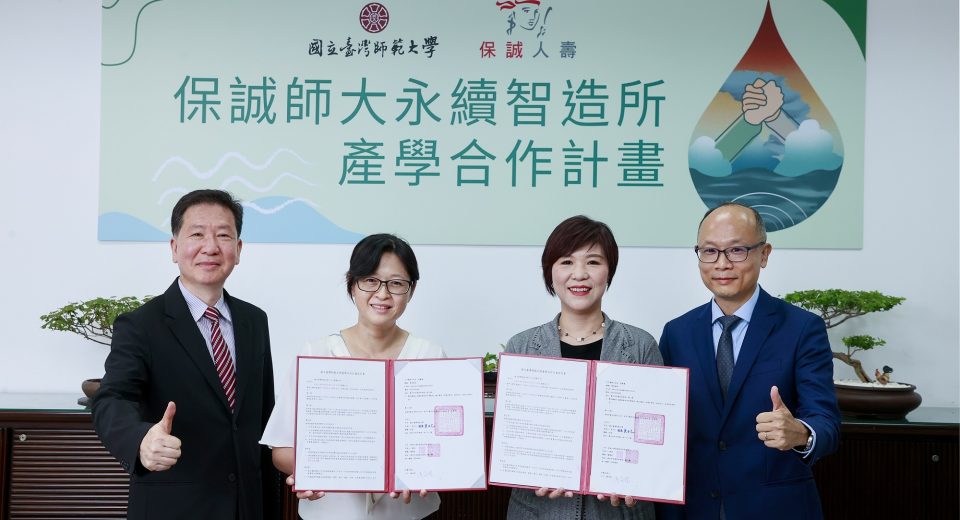
13.4.1 Commitment to carbon neutral university
NTNU is committed to achieving the carbon neutrality goal by “reducing carbon emissions by 50% by 2030 and achieving full carbon neutrality by 2048”. It is actively responding to global climate change and cooperating with the government’s 2050 Net Zero Emission Policy. NTNU is using the strategy of Life Transformation to develop a net-zero green life on campus, promote the action plan for carbon reduction, and achieve the carbon neutrality goal.
